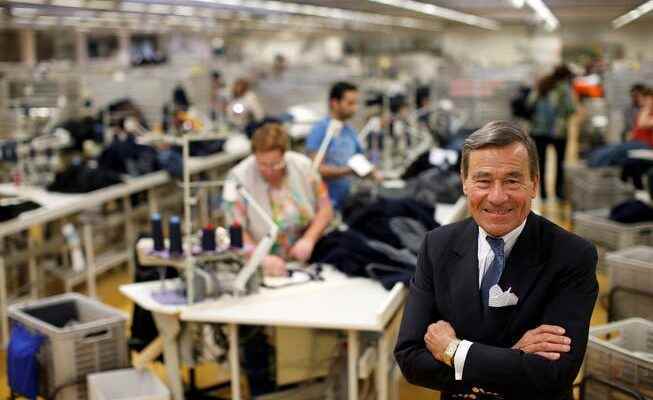Wolfgang Grupp runs one of the few textile companies in Germany. He doesn’t think much of work-life balance, online communication, new-fangled work concepts and megalomaniac managers.
Wolfgang Grupp heads the textile company Trigema.
Wolfgang Grupp embodies the traditional patron as one imagines it: tailored double-breasted suit, shirt with a bottom-down collar, tie and handkerchief. He is the boss and owner of the Trigema Group, one of the few remaining textile companies in Germany, manages 1,200 employees and says sentences like: “Something has to be done for us, and the service has to be done at the right time. Our employees cannot work from home.” The 80-year-old doesn’t have a computer: “I don’t need one as long as I have an overview. E-mails can be printed out in groups. His cell phone is in his closet at home while he is at work. “Because I talk to my people.”
A fierce entrepreneur
In a recent article, the “Frankfurter Allgemeine Zeitung” described him as “perhaps the most combative entrepreneur in the country, completely out of date and at the same time strangely modern”. He likes to read the riot act to politicians and gossip about megalomaniac managers who take profits and socialize losses. In any case, at a panel discussion at the major event “New Work Experience” recently held in Hamburg, he initially came across as a foreign body, drawing the attention of the audience with clear statements and a flair for rhetoric.
While other speakers and panellists ponder the change from an “employment society to a meaningful society”, question traditional attitudes towards work and careers and call for a journey to more personality and purpose, Grupp speaks plainly: “Employees who put their private lives first give it of course. But with us, people have to earn money so that they can support their families.” And still adds: “And then of course they also want to have the feeling that they are needed.”
Grupp has been running the family business based in Burladingen in Swabia for 53 years – with great success. When he took over the highly indebted company from his father in 1969, its turnover was 8.7 million euros. Grupp has cleared out the general store, divested unprofitable business areas and focused on the core business. Since 1975, Trigema has advertised that it is Germany’s largest manufacturer of t-shirts, sweatshirts and tennis clothing. Their annual turnover amounts to 113 million euros.
No short-time work or layoffs at Trigema
Long before marketers discovered the concept of sustainability, Grupp preached corporate responsibility. He started early with the ecological certification of Trigema clothing. While the competition shifted its production to low-wage countries, the company remained true to Germany as a production location. Short-time work or operational layoffs were out of the question at Trigema, even during the corona pandemic.
Grupp also has his own opinion on the fashion trend New Work, as he explained at the Hamburg event: “As an entrepreneur, I have to constantly recognize the changing times. It doesn’t matter to me whether you call it New Work or something else,” he says. It is important that he can pass on the company that his grandfather founded to the next generation. “I have to solve the problems, whether there is a pandemic, war in Ukraine or gas shortages. Because I am liable, with all my private assets, »says the patron.
New Work is a matter of course for him, but he understands it a little differently. As an example, Grupp cites the teamwork and the office space at Trigema. «When I started at the company, everyone had their own office. After two years that was over. All 38 employees who do not work in production sit in the open-plan office and I am in the middle of it – because we have to see each other in order to be able to make decisions together,” explains the entrepreneur. Trigema also demonstrated flexibility and adaptability during the Corona crisis. Without further ado, millions of fabric masks were made.
Job guarantee also for the children of the employees
Finding good employees is not easy for Trigema, as for other companies, as the entrepreneur admits. “We need good people, but we can’t get skilled workers who have graduated from high school into production.” According to its own statements, the company has hardly recorded any disposals. Among other things, this is likely to be related to Trigema’s corporate culture. “You have to show employees that they are important and that they belong to the family,” says Grupp with conviction. “I try to give them that feeling. People surpass themselves when they get recognition and are proud of their company.»
In addition, employees at Trigema have a job guarantee “as long as they don’t make any serious mistakes and don’t steal any golden spoons,” adds Grupp. Grupp even guarantees a job for the children of its employees. This security is important for his employees.
On the other hand, the patron has little use for the concept of work-life balance and flexible time management. In his opinion, free time management would mean that work would be declared a kind of minor matter and the performance of your employees would be degraded. That would send the wrong signals to Trigema employees. At the latest with statements like this, the hair of supporters of New Work stands on end.

The textile company Trigema gained a good deal of notoriety through commercials featuring a chimpanzee.
Truck drivers decide on truck purchase
There are definitely similarities. Personal responsibility, clarity and appreciation: what New Work experts, consultants and coaches repeat mantra-like on every occasion, seems to be lived at Trigema. And when Grupp says that he would never make decisions that are not backed by the majority of the employees, then he apparently means it.
He also asks his truck drivers for advice when it comes to procuring new trucks. “When we had to decide between two providers, I wanted to know from the drivers what surcharge they thought was justified for their previously preferred Mercedes brand compared to the cheaper manufacturer.” And he based his purchase decision on that. “After all, the employees have to deal with it and ultimately bear responsibility for the truck or a newly acquired production machine.”
